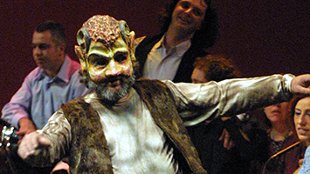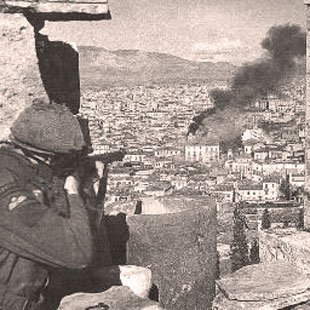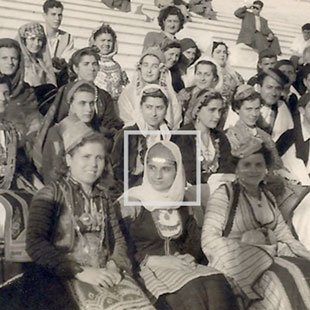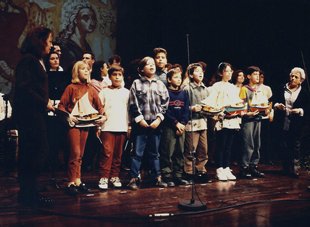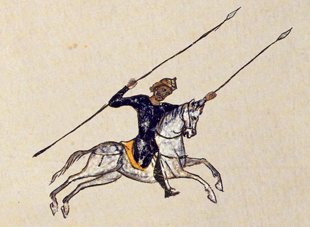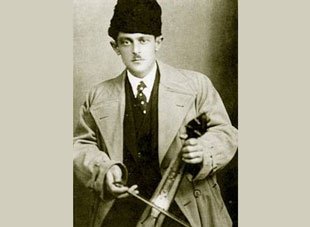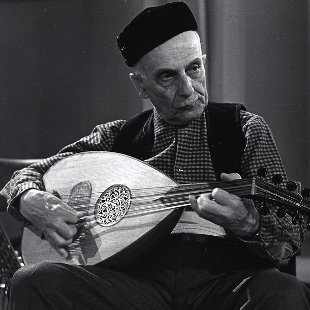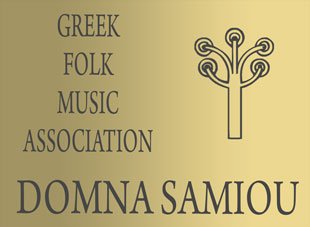You are at: Home page Her Work Press Clippings and Interviews Domna Samiou at the Thessaloniki Concert Hall
Domna Samiou at the Thessaloniki Concert Hall
Interview, Stelios Koukos, Newspaper, Macedonia, 02/03/2003
Text
(extracts)
The grand lady of our traditional songs, Mrs Domna Samiou, together with her regular collaborators and other musicians, will present a performance of carnival songs from various areas of Greece at the Thessaloniki Concert Hall on two evenings (4th and 5th of March).
The performance will not be a conventional concert, but instead a carnival feast with satirical and mocking songs, but also 'indecent', 'foul-mouthed', 'daring' songs, which are sung in the spirit of carnival and spring. Besides, fruitfulness and fertility are the main targets of these songs, which have come down to us from ancient Greece and the ancient rituals of worship.
Groups of musicians and 'revellers' from areas with a tradition of carnival customs and rituals will participate and enact comical snippets. These groups are from Socho, Kozani, Grammenitsa of Arta and Mytilene.
In 1994 Mrs Domna Samiou and the Domna Samiou Greek Folk Music Association issued the record Carnival Songs, which contains these 'holy unholy' or 'foul-mouthed' and 'obscene' songs, which created a stir.
The text which accompanies the record is especially informative and was prepared by the professor of classical literature Michalis Kopidakis, the ethnomusicologist and researcher Miranda Terzopoulou and the professor of ethnomusicology and director of the Museum of Greek Traditional Musical Instruments Lambros Liavas.
The theatrical direction of the performance has been undertaken for the Thessaloniki Concert Hall by Daphne Djaferis, the stage design supervision is by Thanassis Boulougras, the scientific substantiation by Miranda Terzopoulou and supervision of motion by Zoe Margari. Yiannis Syglettos is in charge of sound and Kostas Mylonas is the assistant director.
We spoke to Domna Samiou, who with exceptional knowledge and consistency has been projecting our [musical] traditions in Greece and abroad, about the performances.
[....]
Will we be hearing the songs of the record [Carnival Songs] in the concert?
The orchestra, the choir and I, will be performing songs from the record, as well as some others which I have added specifically for the concert. We have augmented and expanded the program with the inclusion of certain musical groups. One group of bell-bearers1 will come from Socho, a fanoi2 group will come from Kozani and another from Grammnitsa in Arta. These are ordinary people, completely simple, who will present a merry-go-round, a parody of a wedding and the like. A singer from Mytilene will also join, who will present traditions as they a enacted there. I will also be bringing with me from Athens the dancing troupe 'Perperuna'.
So this is not a concert. What is it? An performance? A play?
Essentially it is a performance. A concert usually implies just music and song, whilst here there are other things involved, like little acts … It is a performance.
Did you have any problems teaching these songs? How did your musicians and your choir receive them? Did they enjoy them?
They received them extremely well, as did the public. The accepted them well, apart from a few small minded people, who when the record was published said that 'Samiou has made a pornographic record'. But it does not matter, 'Forgive them … for they know not what they do'. Anyway, when [the record] first came out, I asked the professor of classical philosophy Michalis Kopidakis to prepare an article. He wrote a very good text titled 'More ancient that Dionysus'. Because we should not forget that these songs have come to us from antiquity.
Many times women have the lead role in these 'foul-mouthed' songs...
Not only. Women do not often sing them in public. Back then, when I went to do my research in Kozani, Tyrnavos and Drymos, the women took me to a house far away, at the edge of the village, so the rest of the village would not hear. Whilst the men during the fanoising the 'obscene', the daring songs as you might say, more easily...
I would like to draw attention to the second song on your record, It is the custom every year, from Naxos, which contains an entire philosophical viewpoint. Possibly the most sensational folk song I have ever heard.
Of course. 'This earth we tread on, we will all end up inside...'. Short and succinct. But it continues '...dance, dance, to enjoy your youth, because you will not find it again in this world. Enjoy yourselves young men, enjoy yourselves young girls, enjoy yourselves proud youths, for I have put shackles of the devils hoofs. This earth with its grass eats up young girls and youths, this earth with its flowers eats young men and young girls. This earth we tread on, we will all end up inside...'
I hope the public of Thessaloniki will honour us with their presence. After all this is not something I requested, the Thessaloniki Concert Hall asked me to do it. I hope they will come and enjoy themselfes with us and be satisfied. And they should not judge us to harshly, because that is how the songs go.
You have a vast archive. Are you preparing to issue any new records?
Last year, in June 2002, the double cd Songs of Dame Sea was issued, with a trilingual [booklet] in Greek, English and French, with translations of all the lyrics and texts.
[....]
When you are upset, which song comes to mind?
Anything that pops up at that moment, both in happiness and in sadness. Song has saved me, at the most difficult moments of my life. And I say that to all the kids whom I have had as students at the Museum of Greek Traditional Musical Instruments. Turn away from antidepressants and start singing and dancing. Dance! That is the best.
Have you ever tried writing songs?
No, never. With such a treasure at my disposal, what could I write and why would I? These songs were written centuries ago and are still on the lips of the Greek people. The oldest ones we have are the akritan songs. About Digenis, about Kostandas, about Yiannis– those are all names of akritan heroes. And people still sing them. How many centuries have gone by? Ask anyone which song was a hit last year and he will not know. Because every three months there is something fickle [becoming a hit]. Whilst these songs have come through the centuries and people still sing them.
[...]
1 Bell-bearers: In certain areas of Greece it is traditional for men to dress in sheep skins and masks and tie bells on their costumes during Carnival celebrations.
2 Fanoi: Lamps. In this case the term refers to the tradition of lighting large fires during Carnival, around which participants dance and sing 'obscene' songs.
Translated by Alexander Seferiades
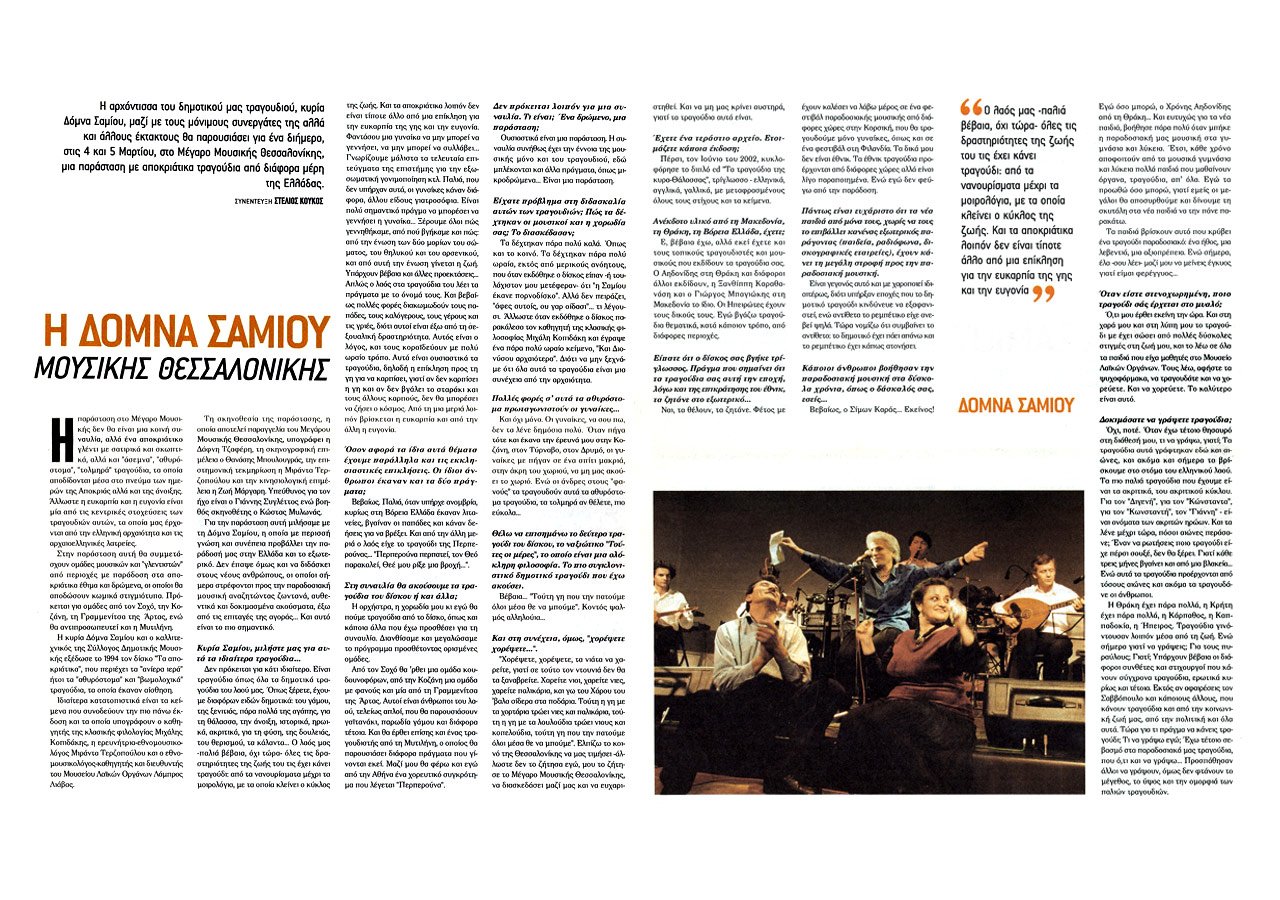
Domna Samiou at the Thessaloniki Concert Hall
Interview, Stelios Koukos, Newspaper, Macedonia, 02/03/2003
Concerts
